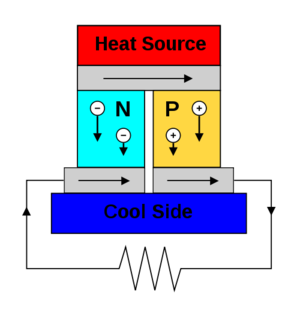Thermoelectric Generators: Difference between revisions
(inserted Marcin video (2009): "$1/Watt Solar Thermal Concentrator Steam Powered Electric Generator" (OSE Distillations)) |
(consolidated page with "Thermoelectric Devices" (content merged)) |
||
| Line 1: | Line 1: | ||
[[File:500px-Thermoelectric Generator Diagram.svg.png|thumb|right|A thermoelectric circuit composed of materials of different [https://en.wikipedia.org/wiki/Seebeck_effect Seebeck] coefficient (p-doped and n-doped semiconductors), configured as a thermoelectric generator.]] | |||
Thermoelectric generators turn heat into electricity. They have great potential for reliable conversion of heat to electricity. For example: [http://www.tegpower.com/ TEG Power Info] lists a 50 Watt 12V unit. If you get 20 and hook them up to a [[gasifier]] then you have something that can do useful work. It has one moving part. Which is a small easily replaceable cooling pump. These will last 20+ years and '''reliably''' produce power. | |||
== Thermoelectric (TE) effect == | |||
(text here) | |||
== TE devices - characteristics == | |||
* electricity generation from heat. This can potentially be very inexpensive if low-cost TE generators can be fabricated. | |||
==Marcin Comment== | |||
This is excellent. Do you have practical experience with these? Can you lead a design effort to produce a robust, replicable TEG system? The heat sinking and packaging issues are not trivial in terms of making lifetime design systems, so that is why we have stayed away from these. Are you familiar with how to manufacture these? That would be very valuable information for resilient community enterprise. | |||
<html> | |||
<iframe width="420" height="315" align=right src="https://www.youtube.com/embed/XK6wmRVX6Uc" frameborder="0" allowfullscreen></iframe> | |||
</html> | |||
= | == Applications and Product Ecology == | ||
* small scale production possible ? practical materials | |||
* TE effect for small-scale solar thermal electricity (see: [[heliostat]]) | |||
* heat from biomass (combustion; pyrolysis, see: [[biochar]]) | |||
== External links == | |||
* [http://en.wikipedia.org/wiki/Thermoelectric Thermoelectric materials] | |||
* [http://en.wikipedia.org/wiki/Thermoelectric_generator Thermoelectric generator] | |||
* Phys.Org article: [http://phys.org/news/2014-12-thermoelectric-power-economically-competitive-renewable.html "Thermoelectric power plants could offer economically competitive renewable energy"] | |||
[[Category:Energy]][[Category:Solar Power]] | |||
Revision as of 17:27, 16 May 2016

Thermoelectric generators turn heat into electricity. They have great potential for reliable conversion of heat to electricity. For example: TEG Power Info lists a 50 Watt 12V unit. If you get 20 and hook them up to a gasifier then you have something that can do useful work. It has one moving part. Which is a small easily replaceable cooling pump. These will last 20+ years and reliably produce power.
Thermoelectric (TE) effect
(text here)
TE devices - characteristics
- electricity generation from heat. This can potentially be very inexpensive if low-cost TE generators can be fabricated.
Marcin Comment
This is excellent. Do you have practical experience with these? Can you lead a design effort to produce a robust, replicable TEG system? The heat sinking and packaging issues are not trivial in terms of making lifetime design systems, so that is why we have stayed away from these. Are you familiar with how to manufacture these? That would be very valuable information for resilient community enterprise.
Applications and Product Ecology
- small scale production possible ? practical materials
- TE effect for small-scale solar thermal electricity (see: heliostat)
- heat from biomass (combustion; pyrolysis, see: biochar)